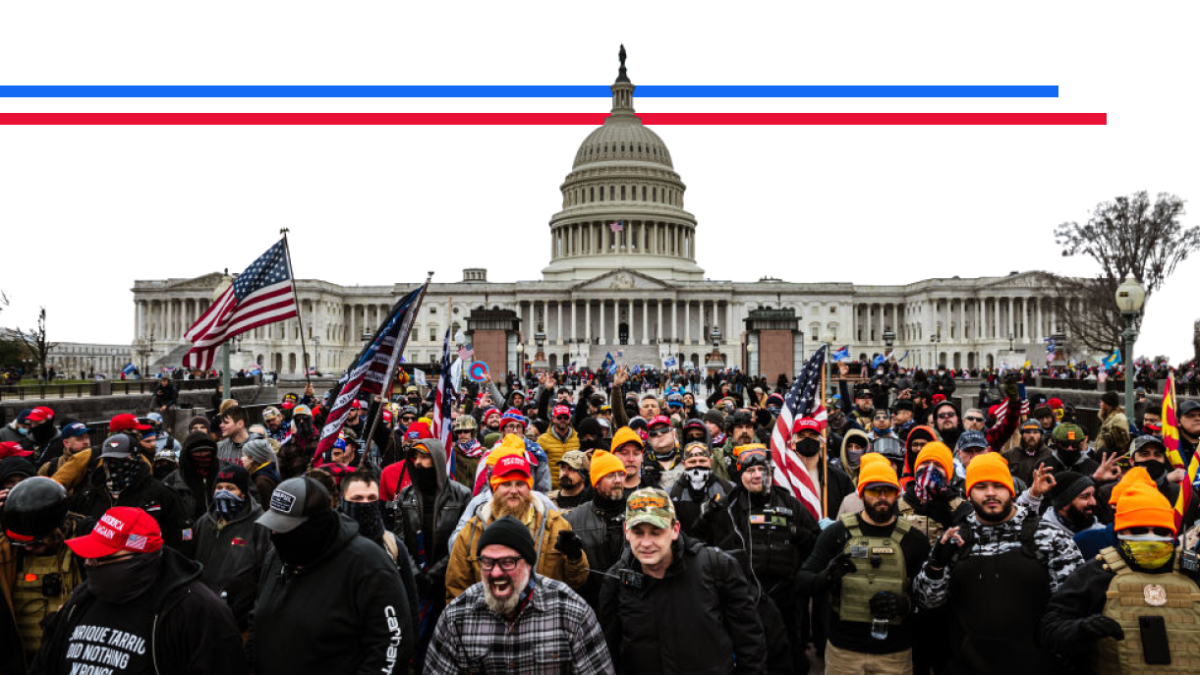U.S. Public Opinion on Accountability for January 6 Insurrectionists

Ideological Influences on Accountability Among the American Public
On January 6, 2021, a joint session of Congress was scheduled to count electoral votes* that would formally establish Joe Biden’s victory over Donald Trump in the presidential election. That morning, thousands of supporters of President Trump gathered on the national mall, where they heard speeches from Trump and other Republican elected officials and activists, all claiming that the 2020 election had been stolen. As the speeches concluded, over 2000 attendees marched toward the Capitol, where the extremist group The Proud Boys had already started to assemble, and breached the Capitol building. They attacked police and journalists, vandalized the building, and looked for elected officials, chanting threats of harm for several hours of occupation.
In the wake of the attack, Donald Trump was impeached for a second time, charged with incitement of insurrection, and the Department of Justice launched the most extensive criminal investigation in U.S. history. Over 830 participants have been charged with crimes, with 43% being sentenced to time in prison. More participants continue to be prosecuted. There may be further consequences: While several insurrectionists have now run for elected office, a federal appeals court ruled in May 2022 that those charged with participation in the insurrection may be barred from holding public office.
In this white paper, we present an analysis of public opinion around accountability for the participants in the January 6 attack on the Capitol. Who supports accountability, who does not, and what sorts of ideologies are related to divisions around public opinion accountability?
Summary of Key Takeaways
- Over three-fourths of Americans think accountability is important for people convicted in the January 6 attack on the Capitol. 63% think it is “very important.”
- The population of Americans who do not think accountability is important for January 6 insurrectionists is concentrated almost entirely among self-identified conservatives. Virtually all progressives (98%) and liberals (97%) and the vast majority of political moderates (80%) want accountability.
- Roughly half of political conservatives also want accountability. There are specific ideological divisions among conservatives correlated with who thinks accountability is important.
- The two most powerful predictors of not wanting accountability among conservatives are believing the conspiracy theory about rigged voting machines and believing that accepting diversity is not important to being an American. Other factors identified as especially important were distrust of the media, belief in the justifiability of violence, respecting institutions and laws, and belief in the QAnon conspiracy theory.
- Holding Christian nationalist views was not an important factor explaining divisions on views on accountability among conservatives.
- Beyond “accepting diversity,” other types of ethnonationalist views did not emerge as important predictors of views on accountability among conservatives.
Accompanying this white paper is a five part series where we break down different parts of the findings we discuss in the report. We begin with an important discussion of missing survey data. It’s generally standard practice to disregard those who either refuse to answer certain questions and/or those that drop out of a survey before the end. But who is missing and why can have important implications for findings. Understanding more about what questions people did not answer and who dropped out of a survey can shed some light on what those implications might be. Missing data might be dry to talk about, but we think ignoring these details is akin to leaving data on the table.
In the following four installments of our series, we go deep into the topics of christian nationalism, ethnonationalism, conspiracy theories, and anti-establishment attitudes to see how these emerging dimensions of political ideology relate to opinions on accountability. Follow along and also download the technical report below for all the nitty gritty details.
* The electoral count for every Presidential election happens on January 6, pursuant to the Electoral Count Act.